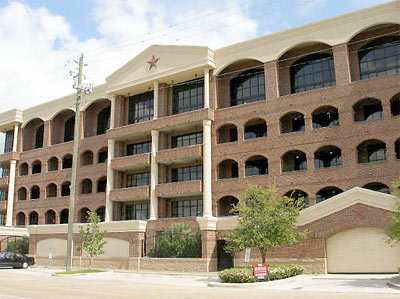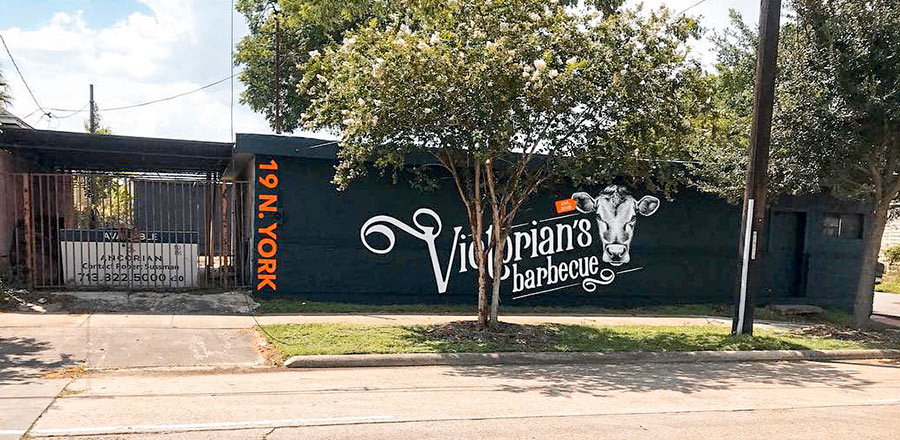
Allen Stanford’s international “banking” empire is falling apart. How’s his work as a Houston real estate developer holding up?
Stanford Development Corporation still owns a couple of units on the top floor of the Stanford Lofts, the 5-story East Downtown condo building topped with a starred tiara that the company completed in 2002, just a few blocks east of Minute Maid Park. But owning the condos didn’t prevent the condo owners association from filing a construction-defect lawsuit against the Stanford Lofts developers and builders in 2007, charging Stanford Development with “breach of contract, Deceptive Trade Practices, breach of warranty, fraud, and negligent design, construction, and supervision.”
The summary of problems with the building included in the original complaint is 9 pages long, and includes failure to meet building codes, wall cracks and leaks, structural movement, and a series of defects causing continuing problems with water infiltration. The repair estimate: more than $2 million.
The case has dragged on for some time. Attorneys for the Stanford Condo Owners Association complained that Stanford Development was dragging its feet, arguing last year in response to a stay request:
***
If this stay is granted, SDC will have succeeded in delaying this matter for at least a year, giving the Association the Hobson’s choice of waiting indefinitely for the appeal to play out, and later to complete discovery and have a jury trial, or giving in to SDC’s demand and arbitrate to get a ruling a year sooner. Not only are the problems continuing, but sales of units have essentially shut down. Unit owners cannot sell a unit without disclosing the problems, and no sane buyer would buy into this mess. . . . The building needs to be properly repaired before sales can resume. The delay is really hurting the Association and the unit owners, and the damages are ongoing.
Lawyers for Stanford Development argued that the case had no business in court, because of an arbitration clause contained in all the earnest-money contracts. But a trial court denied Stanford’s motion to compel arbitration.
Late last month, the First District Court of Appeals reversed that ruling. In an opinion penned by Chief Justice Sherry Radack, the court held that the arbitration agreements were binding on the owners association, because it had based its suit in part on the contracts that contained them.
What about owners who didn’t sign contracts with Stanford Development, but bought from previous individual owners? Could anyone buy a condo and then sue? Sorry: The appeals court also ruled that all future buyers will be stuck with arbitration too.
- The Stanford Lofts [Stanford Development Corporation]
- Stanford Condominium Owners Association vs. Stanford Development Corporation [Harris County District Clerk]
Photo: HAR





2011 and problems continue at The Stanford Lofts. Despite majority disapproval of the loft homeowners, The five board members which make up the Home Owner’s Association continue to make bad financial choices.
The first bad judgement, to sue the builder, costing the owners a combined $200,000. And for a lawsuit that was complete non-sence. Big waste of money. The major flaw in the “Plaintiff’s Original Petition No. 2007-50115” filed in Harris county, is that it goes against all the buyers Earnest Money Contract, which reads: “All claims for breach of Contract or otherwise are limited solely to the specific remedies provided for herein. Buyer and Seller hereby further agree that any controversy, claim or dispute arising out of or relating to the contract, any breach thereof, the sales transaction reflected in the contract, the construction of the residence which is the subject of the contract and/or any representations or warranties, express or implied, relating to the property and the unit, shall be
decided by binding arbitration in accordance with the Construction Industry Arbitration Rules of the American Arbitration Association. All decision by the arbitrators shall be final and any judgement upon the award rendered by the arbitrators may be confirmed, entered and enforced in any court having proper jurisdiction. Any action, regardless of form, arising out of the transactions under this contract must be brought by buyer within 2 years of the closing date, regardless of when the cause of action accrues or discovery of claim by buyer.” This is from Number 16 of every buyers Earnest Money Contract.
Not a smart position for the Stanford Condominium Owners Association to take. It’s not winnable.
Second mistake by the SCOA, is their 2010 assessment on the owners of $500,000.00. That means an individual owner would have to pay between approx $10,000 to 20,000 in additional HOA fees for the year 2010.
Some of the money was used to fix problems in the building, but over half the money was for fluff like upgrades, which owners are not supposed to have to pay for.
Many owners were forced to foreclose. I counted more then 5 out of the 37 owners foreclosed. Many of the foreclosures were picked up by current residents or board members.
And there is no good news on the way at this place. More assessments to come!!
I wouldn’t buy here. Look up all the lawsuits filed by buyers filing suit against sellers and even against realtors.